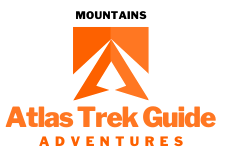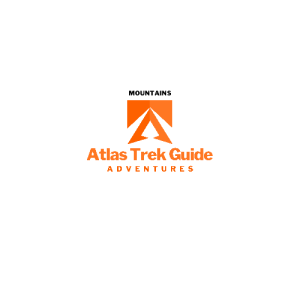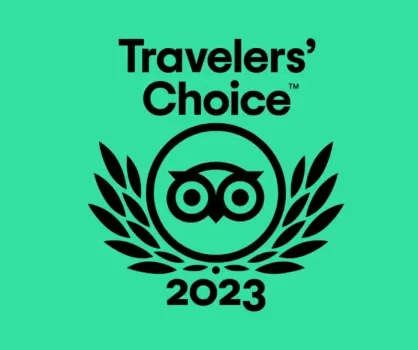3 Day trek Berber villages
3 Day trek Berber villages
An easy & interesting overnight trek in a colorful and authentic Azzaden valley at the heart of the Berber Ait Ouazzaden tribe.
Azzaden Valley trek
3 Days Trek Morocco
Easy to medium & interesting 3 day treks through the berber villages & valleys of Imlil and Azzaden, meet the berber communauty.
Atlas Mountains Hikes
The Best Trails for Hiking in the Atlas Mountains in Morocco ; 1. Mount Toubkal. TOP CHOICE FOR ICONIC SUMMITS. Easy access to the mountain from to Marrakech.
TREK IN THE BERBER VILLAGES
Hike 3 days in Imlil and in the Valleys of Azzaden
There are some fascinating 3-day hikes available for beginners and intermediate-level hikers. These hikes will take you through the Berber villages and the valleys of Imlil and Azzaden, allowing you to experience the Berber community. This route is perfect for families with children and elderly individuals, as it offers a comfortable ride on mules or a leisurely walk to explore the scenic mountain passes and villages while enjoying the beautiful valley views. For those seeking more adventure, the trek can be extended to cover longer distances and include climbs to side peaks.
Highlights of the 3-Day Berber Villages Hike:
Varied Landscapes: Traverse from the scenic Imi Oughlad to the charming village of Tinzert, witnessing diverse landscapes that showcase the beauty of the region.
Berber Villages: Immerse yourself in the rich Berber culture, interacting with locals in Ait Aissa and experiencing the traditional way of life in these mountainous hamlets.
Panoramic Views: Conquer the Tizi n Mzik pass, reaching an elevated vantage point that offers breathtaking panoramic views of the surrounding mountains and valleys.
Natural Beauty: Explore the picturesque Azzaden Valley, surrounded by stunning landscapes and traditional Berber villages, providing an authentic taste of rural life.
Descent to Imlil: Descend through diverse terrains, concluding your trek in the charming village of Imlil, offering a sense of accomplishment and a final glimpse of Berber mountain life.
3-Day Berber Villages Hike Itinerary:
DAYS 1: Marrakech - Imi Oughlad - Tinzert:
You will leave the vehicle on the road that climbs towards Imlil at Imi Oughlad (1450 m), where you will meet your muleteer and Berber guide. Your first day will be an easier acclimatization trek in Ouirgane National Park. The terrain here is easier to practice, with copper-green soil and junipers. Night in a lodge in Tinzert, a small rustic Berber village. About 4 hours of walking.

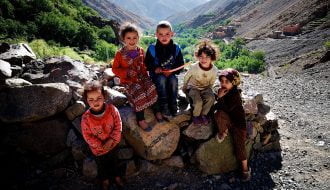
DAY 2: Tinzert - Azzaden Valley (Ait Aissa):
After breakfast, you will leave the valley to reach the magnificent valley of Azzaden. You will admire the view of many mountains surrounded by lush walnut forests that leads to Toubkal and its twin peaks at the top of the valley. You will then spend the night in a village lodge in Ait Aissa. About 5–6 hours of walking
DAYS 3: Ait Aissa - Tizi n Mzik - Imlil:
On this third day, you will climb to the top of the Azzadene valley. You will take the direction of the valley via Tizi Oussem, from where you will climb to the Tizi n Mzik pass (2489m) before descending to Imlil. After lunch in Imlil, you will be transferred to Marrakech, giving you plenty of time to explore the city in the evening. About 4-5 hours of walking
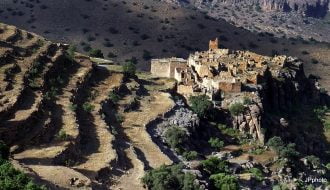
What’s Included:
- Professional Mountain Guide.
- Meal.
- lodging.
- All meals are included.
- Guide, mules and staff are included.
- Transfers from and to Marrakech are included.
Waht’s not included:
- Drinks
- Tips
- Sleeping bags
- Mineral water

Morocco Berber History
Believe it or not, Berber history goes back to prehistoric times. In fact, Morocco is home to the oldest Homo sapiens ever found—nearly 300,000 years old! This means that the indigenous people of Morocco have been here for a long, long time. Longer than any other known group of people in the world. Much of what we know about the very first people of Morocco comes from archeological records. Of the Berbers themselves, well, much of that history is oral. In fact, it’s probably a mistake to call them “Berber” at all!
The Berbers proudly call themselves the Amazigh, the “free people.” The name “Berber” derives from “barbary,” that is, from the Greek barbaria. Though “Berber” is commonly used throughout Morocco, both by those who identify as Amazigh and other Moroccans, it’s probably not the nicest or most accurate name.
Thousands of years ago, the Amazigh ruled all of North Africa, largely through different tribes. They would crisscross over the Sahara and throughout the southern basin of the Mediterranean for trade and travel. Over the centuries, they have been called by many names: The ancient Greeks called them “Libyans.”
Romans called them variously “Numbians” and “Africans,” while much of medieval Europe referred to this collection of tribes in North Africa as “Moors.” In fact, it was the Arabs who came up with the Berber name: Al-Barbar. This was likely a re-adaptation of the ancient Greek term “barbar.” However, there is some thought, as written by the Arab scholar Ibn Khaldun, that there could have been an ancient person by the name of “Barbar,” or in some texts, a mother named “Barbara,” who gave the name to the tribes, perhaps around Somalia.
When Moulay Idriss, the founder of modern Morocco, fled the Abassid Dynasty, he brought Islam with him, peacefully converting the Awraba tribe and establishing the Idrissid Dynasty. Prior to then, most Berbers across all of North Africa were Anamist, Christian, or Jewish. Islam quickly spread through the region, though it was somewhat different from what was practiced in the Middle East. Two of the greatest historic Moroccan dynasties, the Almoravids and Almohads, were Islamic Berber dynasties that ruled large parts of Spain and northwest Africa.
Over the years, the Amazigh have battled, traded, negotiated, and played host to the Phoenicians, Carthaginians, Romans, Arabs, Spanish, and French. Even though the Romans and others have tried to colonize the Berber people, they have managed to preserve their own language and culture, and in reality, they have never been conquered!
Berber language is primarily oral in nature, although they have had their own writing system for at least 2,500 years. Sometimes hard to find, the earliest writings can be found cataloged in the small museums throughout the south. More recently, the language has been officially codified and, alongside classical Arabic, is one of the two official languages of Morocco.
